SEMANA No. 37
07 - 10 DE NOVIEMBRE
SEMANA DE NIVELACION
6° GRADO
NOTA : TRAER MATERIAL DE TRABAJO A CLASE YA SEA IMPRESO O COPIADO EN UNA HOJA O CUADERNO. SOLAMENTE LOS ESTUDIANTES QUE HAN TENIDO DIFICULTADES EN EL 4° PERIODO.
ACTIVITY No. 1
ACTIVITY No.2
SEMANA No. 37
07 - 10 DE NOVIEMBRE
SEMANA DE NIVELACION
NOTA : TRAER MATERIAL DE TRABAJO A CLASE YA SEA IMPRESO O COPIADO EN UNA HOJA O CUADERNO. SOLAMENTE LOS ESTUDIANTES QUE HAN TENIDO DIFICULTADES EN EL 4° PERIODO.
7° GRADO
ACTIVITY No.1
ACTIVITY No. 2
SEMANA No. 36
SEXTO GRADO DEL 30 OCT - 03 NOV
ACTIVITY No.1
ACTIVITY No. 2
ACTIVITY No.3
VOCABULARY OF CLOTHES
ACTIVITY No.4
VOCABULARY OF CLOTHES
SEMANA No. 35
SEXTO GRADO DEL 23 - 27 OCTUBRE
VOCABULARY OF TYPES OF FOOD
ACTIVITY No. 1
ACTIVITY No.2
ACTIVITY No.3
PUT COLOUR AND MATCH THE NAME WITH THE PICTURE
ACTIVITY No. 4
ORGANIZE THE FOOD IN THE PYRAMID AND PUT COLOR

WELCOME TO CLASS
SEMANA No. 34
SEXTO GRADO DEL 17 -20 DE OCTUBRE
NOTA: EN CADA CLASE LLEVAR DOS ACTIVIDADES PARA TRABAJAR.
TOPIC: CELEBRATIONS
ACTIVITY No. 1
ACTIVITY No. 2

ACTIVITY No. 3
ACTIVITY No. 4
SEMANA No. 33
SEXTO GRADO
FIRST CLASS: GRAMMAR PRESENT CONTINUOUS
COGNITIVE PHASE
MODELATION
EJERCITACION
ACTIVITY SECOND CLASS
SEXTO GRADO
WELCOME TO FOURTH PERIOD
SIXTH GRADE (6)
GUIA DE APRENDIZAJE

I.E.D. GERMAN VARGAS CANTILLO
Subject: English
Teacher: Lic. Adela Gómez González
Period: IV
Grade: 6°
Topic: Present Progressive or continuous
Eje
temático: what are you doing in your free time?
Recursos:
cuadernos, tablero, marcadores, fotocopias, videos, fotocopias guías, laminas
elaboradas por los estudiantes.
ETAPA 1: Identificar los resultados deseados
|
|
METAS DE COMPRENSIÓN. Identifica la estructura gramatical del
presente progresivo (Present
progressive) en textos cortos y sencillos en relación con su entorno.
|
|
COMPRENSIONES: Los estudiantes:
ü Reconoce el uso del presente progresivo en actividades que suceden en su
entorno.
ü Usa adecuadamente las reglas gramaticales para conjugar los verbos en presente progresivo
ü Formula y contesta preguntas de forma oral y escrita usando
correctamente la estructura gramatical del presente progresivo.
ü Crea un texto corto y sencillo sobre
una descripción de un evento usando presente progresivo
ü Demuestra interés y respeto por la clase siguiendo instrucciones dadas lo
cual le permite participar activamente de una forma cooperativa.
|
HILOS CONDUCTORES:
DEMOCRACIA Y PAZ: CONVIVENCIA EN EL AULA
ü
Where is Shakira singing?
ü
What is she cleaning?
ü
What is he doing in the park?
ü
Who is Reading a book?
ü
what is mary studying ?
ü
why is the baby crying?
|
SABER:
ü conjugar correctamente el verbo to be en
la estructura del presente progresivo
ü Hace preguntas y respuestas observando
imágenes o situaciones
ü Reconoce verbos en infinitivo.
ü Reconoce los pronombres personales.
ü Identifica
el vocabulario de celebrations, foods y clothes
ü Aprende reglas gramaticales y verbos
para construir oraciones.
ü Observa un diario y comenta sobre las
accione de una persona.
ü Lee un texto y completa espacios en
blanco.
ü Responde a preguntas según lo leído.
ü Utiliza verbos para completar un mapa
conceptual.
ü Escribe oraciones usando el orden
correcto.
|
SABER HACER:
ü Utiliza la estructura gramatical del presente progresivo
apropiadamente en pequeñas
conversaciones
ü Completa información sobre su rutina diaria utilizando
el presente progresivo.
ü Escribe o narra sus propias acciones y el de otra
persona.
ü Expresa estados de ánimo y sentimientos personales a
través de conversaciones sencillas
ü Intercambia información relacionada con situaciones
cotidianas en el aula de clase.
ü Elabora un dialogo y lo representa
SABER SER:
ü
Valora sus características
personales y
las de sus pares.
ü
Respeta las
diferencias físicas, culturales, ideológicas, entre
otras, de
sus compañeros de clase.
ü
Participa activamente en las actividades.
ü
Interioriza la importancia
del
cuidado personal integral.
|
ETAPA 2: DESEMPEÑOS DE COMPRENSIÓN
|
|
Tareas situadas en contextos reales:
ü
Participa en una conversación
Corta.
ü
Describe las acciones que realiza a diario.
ü
Da y pide información personal.
ü
Se presenta a sí mismo y a otras personas.
ü
Reconoce
la importancia por aprender el segundo idioma.
|
Otras tareas:
ü
Role play.
ü
conversaciones en clases
ü
Sopas de letras
ü
Compromisos sobre conjugación del presente simple
ü
Socialización de información personal (daily routine)
ü
Lottery
ü
Bingo
|
ETAPA 3: PLAN DE EXPERIENCIA DE ENSEÑANZA
|
|
ACTIVIDADES:
ü Se toman en cuenta los conocimientos previos de los
estudiantes a través de una conversación para tratar de dar respuesta a los
hilos conductores.
ü Socialización de las metas de comprensión.
ü Socialización de los desempeños de comprensión o tareas
que deben presentar durante el desarrollo de la temática, con el fin de
ayudarlos a conocer hacia dónde vamos y que se espera de ellos.
ü Explicación general sobre la estructura gramatical del
presente progresivo.
ü Socialización y explicación del tema mediante un mapa
conceptual.
ü Vocabulary: celebration, foods and clothes.
|
|
PROGRAMACIÓN DE CLASES POR SEMANA
SEMANA No.31
1º CLASS
PLAN DE ESTUDIO 4º PERIODO
SIXTH GRADE
ESTANDAR
Puedo expresar mis ideas, sensaciones y
sentimientos mediante oraciones cortas y claras con una pronunciación que es
comprensible.
Mi ortografía es aceptable aunque cometo errores en
palabras que no uso con frecuencia. El lenguaje que domino me permite expresarme
sobre temas cotidianos o sobre los que tengo conocimiento, pero es normal que
cometa algunos errores básicos
LOGRO
|
Identifica la estructura gramatical del presente progresivo
(Present progressive) en textos cortos
y sencillos en relación con su entorno.
INDICADORES DE LOGRO
|
1 .Reconoce el uso del presente progresivo en actividades que suceden
en su entorno.
2. Usa adecuadamente las reglas gramaticales para conjugar los verbos en presente progresivo.
3. Formula y contesta preguntas de forma oral y escrita usando
correctamente la estructura gramatical del presente progresivo.
4. Crea un texto corto y sencillo sobre
una descripción de un evento usando presente progresivo.
5. Demuestra interés y respeto por la clase siguiendo instrucciones
dadas lo cual le permite participar activamente de una forma cooperativa.
TOPICS
|
Present progressive
Affirmative form
Negative form
Interrogative
form
Vocabulary
Celebrations
Foods
clothes
|
2º CLASS
REVIEW
SEMANA No. 32
25-29 SEPTEMBERVOCABULARY OF VERBS
FIRST CLASS
SECOND CLASS
OJO MONTAR ACTIVIDAD
------------------------------------------------------------------------------------------------------------------
SEVENTH GRADE (7)
GUIA DE APRENDIZAJE

I.E.D.
GERMAN VARGAS CANTILLO
Subject:
English
Teacher:
Lic. Adela Gómez González.
Period:
IV
Curso:
7°
Topic:
FUTURE TENSE (Be going to and will)
Vocabulary
: imperatives
Eje
temático: what are you doing in Cartagena next week?
Recursos:
cuadernos, tablero, marcadores, fotocopias, videos, fotocopias guías, laminas
elaboradas por los estudiantes.
ETAPA 1: Identificar los resultados deseados
|
|
METAS DE COMPRENSIÓN: Comprendo el
uso de los imperativos (Imperatives)
de manera oral y escrita en acontecimientos del diario vivir.
|
|
COMPRENSIONES:
Los estudiantes:
ü Reconoce
vocabulario relacionado con verbos para dar las instrucciones del trabajo en
clase haciendo uso de los imperativos.
ü Identifica
en textos variados los verbos creando con ellos oraciones de carácter
imperativo.
ü Utiliza los
imperativos para elaborar Flash Card con acontecimientos del diario vivir.
ü Demuestra
con su actitud interés, responsabilidad, respeto orden y pulcritud frente a
las actividades a realizar en clase.
ü Identifica
la imagen y construye oraciones utilizando los imperativos.
|
HILOS CONDUCTORES:
Sostenibilidad
ü Will you go to the stadium tomorrow?
ü What are you going to study next year?
ü When do you see this picture?

a.
Church
b.
House
c.
road
|
SABER:
ü Identifica las formas verbales del
tiempo futuro en inglés.
ü Comprende textos y enunciados relacionados
con diversos temas y personas sobre el futuro en inglés.
ü Realiza escritos y presentaciones orales
tomando en cuenta habilidades y posibilidades en diferentes situación.
ü
Interpreta y elabora
pequeños textos en future tense
ü
Realiza ejercicios prácticos
en future tense y con los imperatives.
ü
Traduce e interpreta textos
con varios párrafos con construcciones en future tense.
|
SABER HACER:
ü Hablar y escribir sobre sus situaciones
del futuro en inglés.
ü Comprender la idea principal de textos
cortos orales y escritos sobre eventos futuros en inglés.
ü
Realiza oraciones
imperative.
ü
Conjuga de manera verbal y
escrita verbos en future tense.
SABER SER:
ü Críticos y reflexivos frente a las actividades
programadas en el periodo, mostrando actitud de respeto hacia las opiniones
de los compañeros
|
ETAPA 2: DESEMPEÑOS DE COMPRENSIÓN
|
|
Tareas situadas en contextos reales:
ü
Participa en una conversación
Corta,
usando future tense and imperatives.
ü
Describe acciones en future tense.
ü
Identifica y resalta planes o acciones en future tense.
ü
Elabora párrafos haciendo uso de la estructura gramatical
del future tense.
|
Otras tareas:
ü
Role play.
ü
conversaciones en clases
ü
Sopas de letras
ü
Compromisos ejercitando la estructura del future tense
and imperatives..
ü
Lottery
ü
Bingo
|
ETAPA 3: PLAN DE EXPERIENCIA DE ENSEÑANZA
|
|
ACTIVIDADES:
ü Se toman en cuenta los conocimientos previos de los
estudiantes a través de una exposición para tratar de dar respuesta a los
hilos conductores.
ü Socialización de las metas de comprensión.
ü Socialización de los desempeños de comprensión o tareas
que deben presentar durante el desarrollo de la temática, con el fin de
ayudarlos a conocer hacia dónde vamos y que se espera de ellos.
ü Explicación general sobre la estructura gramatical del
future tense and imperatives..
ü Socialización y explicación del tema mediante un mapa
conceptual.
ü Vocabulary: verbs and commands.
|
|
PROGRAMACIÓN DE CLASES POR SEMANA
SEMANA No.31
1º CLASS
PLAN DE ESTUDIO 4º PERIODO
SEVENTH GRADE
ESTANDAR
Puedo sostener conversaciones rutinarias
para saludar, despedirme, hablar del clima o de cómo me siento.
LOGRO
Comprendo el uso
de los imperativos (Imperatives) de manera oral y escrita en
acontecimientos del diario vivir.
INDICADORES DE LOGROS
|
WELCOME THIRD PERIOD
III
SIXTH GRADE:6º
ESTANDAR: comprendo textos cortos de cierta dificultad sobre actividades cotidianas y de mi interés, otras asignaturas y mi entorno social. Cuando escucho un texto oral, comprendo la información más importante si me resulta familiar. Puedo sostener conversaciones rutinarias para saludar, despedirme, hablar del clima o de cómo me siento.
LOGRO: Comprende la estructura gramatical del presente simple (Present simple) en oraciones de forma negativa, afirmativa e interrogativa.
INDICADORES DE LOGRO:
1. Reconoce la estructura gramatical del presente
simple en oraciones de forma negativa, afirmativa e interrogativa.
2. Expresa diálogos cortos sobre situaciones
cotidianas usando Wh questions con Do
y Does.
3. Escribe un texto corto y sencillo sobre sus
rutinas diarias usando presente
simple.
4. Conjuga apropiadamente algunos verbos en presente
simple.
5. Demuestra interés y respeto por la clase
siguiendo instrucciones dadas lo cual le permite participar activamente de
una forma cooperativa.
TOPICS:
|
||||||||||||||||||||||||||||||||||||
WELCOME
SECOND PERIOD
6º Y 7º
6º grade : singular and plural noun (II PERIOD)
7º grade (II PERIOD)
PRESENT PROGRESSIVE OR CONTINUOUS
EXERCISES
LOOK AT THE PICTURE AND WRITE SENTENCES USING PRESENT PROGRESSIVE
CONVERSATION PRESENT PROGRESSIVE
7º grade
Carl
|
What are you doing?
¿Qué estás haciendo? |
Paul
|
I'm reading
this article. I have to finish it today
Estoy leyendo este artículo. Tengo que terminarlo hoy día |
Carl
|
Why Do you
have to finish it today?
¿Por qué tienes que terminarlo hoy día? |
Paul
|
Because my
boss wants the main idea.
Porque mi jefe quiere la idea principal |
Carl
|
What is the
article about?
¿De qué trata el artículo? |
Paul
|
It's about job opportunities in Asia
Es acerca de oportunidades de trabajo en Asia |
Carl
|
That sounds interesting
Eso suena interesante |
Paul
|
It is
interesting and difficult. I'm trying to understand these numbers
Esto es interesante y difícil. Estoy tratando de entender esas cifras. |
Carl
|
What is Carla
doing on the computer?
¿Qué esta haciendo Carla en la computadora? |
Paul
|
She is helping
me. She is looking for information on the internet
Ella esta ayudandome. Está buscando información por Internet |
Carl
|
Do you need my
help?
¿Necesitas mi ayuda? |
Paul
|
Well, thank
you. That's very kind of you
Bueno si gracias. Eso es muy amable de tu parte. |
FIRST PERIOD
SIXTH GRADE
6° GRADE
NATIONALITY
SEVENTH GRADE (7)
SIMPLE PRESENT TENSE
VIDEO TUTORIAL DEL VERBO TO BE
PAST TENSE
6° GRADE
SIXTH GRADE
TO BE IN PAST TENSE
WAS - WERE
seventh grade
superlative
My Family
My name is Tomas and I have a big family, I have 3 sisters, Andrea, Samantha and Jennifer.
I also have 2 brothers, John and Peter. I am the youngest of my family I am 9 years old my
sister Andrea is the oldest! , she is 27 years old. We all love to study and to play soccer. My
sister Samantha is the smartest girl in her class and I am the fastest boy in my soccer team, but
My brother Peter is the slowest. John is the smallest person in our family, he is really short!! but
QUESTIONS
1.- Who is the youngest of the family?
5.- Who is the slowest person in the soccer team?
6.- Who is the smallest person in the family?
WEEK 13 - 17 MARCH
SIXTH GRADE ( 6 )



1.- Who is the youngest of the family?
2.- Who is the oldest of the family?
3.- Who is the smartest person in the class?
4.- Who is the fastest person in the soccer team?
6.- Who is the smallest person in the family?
WEEK 13 - 17 MARCH
SIXTH GRADE ( 6 )






SEVENTH GRADE (7)
WEEK MARCH 13 - 17
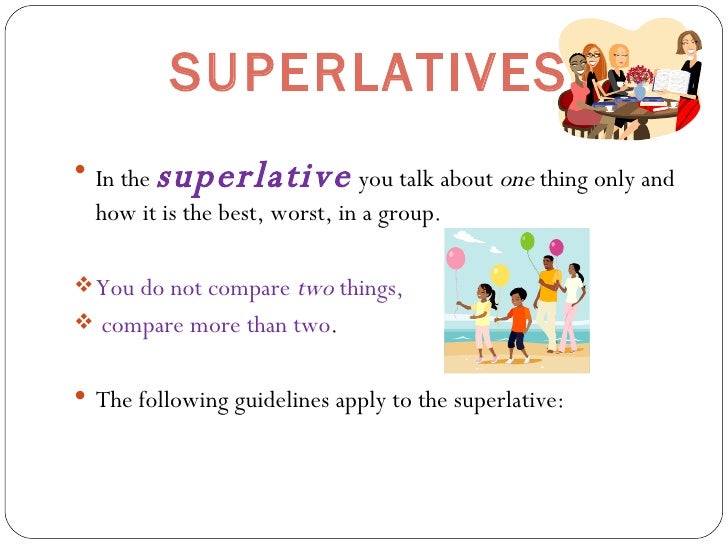


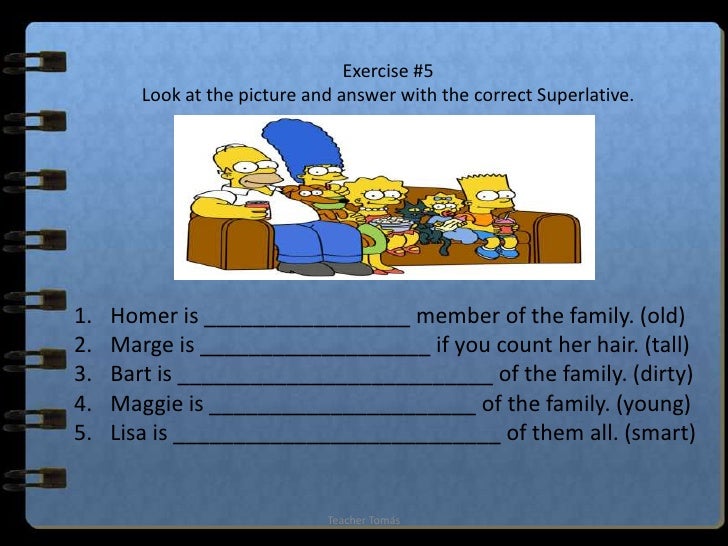
READING COMPREHENSION COMPARATIVE AND SUPERLATIVE
SAO PAULO AN ALPHA WORLD CITY
São
Paulo is the largest city in South America and the third
most populous of the world, with more than 10 million inhabitants. It is the economical capital of Brazil and a
very busy place. It is also the richest in culture, parks and museum.
São
Paulo is centered around the Praça da Sé, where there is a stone mark symbolizing the “point
zero” of the city. The subway system is
cheap and efficient but it covers only a few areas of the city, although
extensions are being made. The most interesting neighborhoods and places to
visit include Jardins, Itaim and The Ibirapuera Park.
The main
tourist attractions in the city include the different neighborhoods with their
special Italian, Japanese or Arabic influence. They have their own
characteristic atmosphere and it is a lot of fun to walk around, go to one of
the many small restaurants or have a drink somewhere.
Brazilians say that Paulistanos (São Paulo locals)
live to work and to eat which is certainly true. Food in São Paulo is the best in the country. You can find it from a variety
of restaurants from the simplest delivery place to the fine expensive ones.
São Paulo is also very much a party town. You can get stuck in the traffic in the
middle of the night when party animals return from their hunt.
Automotive traffic in São Paulo is complicated, especially in main routes all along the
weekdays and gets worse at rush hours (from 8 a.m. to 10 a.m. and from 6 p.m.
to 8 p.m. ). On the weekend traffic is good with some impediments in places where
there are bars, shopping centers or other public attractions.
São Paulo has the largest underground transportation system in Brazil the “Metro”. However, it is not as comprehensive as the trains in Europe or North America but it covers the most important areas.
A) After you have read the previous text, read the next
questions and choose the most accurate one.
1. What time does the traffic get worse in São Paulo ?
a) It gets worse during rush hours.
b) From 8 to 10 a.m. only.
c) In the mornings, from 8 to 10 a.m. and in the evenings from 6 to 8. p.m.
2. Where is São Paulo located?
a) São Paulo is
between Itaim and Ibirapuera park.
b) It is centered where there in a Stone Mark .
c) It is near a beach.
3) Why is São Paulo the largest city in South
America?
a) Because of the amount of inhabitants, it has more
than 10 million people.
b) Because it has a variety in museums and parks which
attracts many tourists.
c) Because of its growing economics and rich culture.
4) Who are the Paulistanos
?
a) People who work
in popular restaurants around São
Paulo.
b) The local people from the largest city of South
America.
c) It is not mentioned in the text.
5) What are the
most interesting neighborhoods in the city?
a) Jardins
and Itaim are included as the most
fascinating ones.
b) There is only one which is Praça da Sé.
c) The most interesting ones are those who have
foreign influences.
B) Find a synonym for
the next words in the text, the
words are in bold:
InHabitants a. laborers b. person c. animals d. people
Main a. unimportant b. mild c. principal d. Intensity
Impediments a. Benefits b. complications c. Assistance d. Aid
Stuck a. confused b. perplexed c. progress d. trapped
Comprehensive a. understandable b. complete c. exclusive d. unlimited
1.1 Answer
the following questions about your city:
1. What is the name of your city?
____________________________________________________________
2. Where is it?
____________________________________________________________
3. What is the city like?
____________________________________________________________
4. How big is the city?
____________________________________________________________
5. What is the best thing about it?
____________________________________________________________
2. Checking your vocabulary
1.2 Write the adjectives in the correct column. Some can go in more than one column
Modern, new, huge, beautiful, elegant, tall, big, quiet, rich, polluted,
dangerous, fantastic, old, ugly, small, noisy, poor, safe, wonderful, sunny, dry, exciting , wet, busy,
cold ,luxurious, crowded, hot, interesting , cosmopolitan, windy.
WATHER BUILDINGS CITY
* ______________ ___________________ _______________________
*____________ ___ __________________ _______________________
*________________ __________________ _______________________
*________________ __________________ _______________________
*________________ __________________ _______________________
* ________________ ___________________ _______________________
1.3 Fill in
the blanks with the appropriate form of the adjective.
1. London is the _______________ (big/bigger/biggest)
city in the United Kingdom.
2. Manchester is _______________ (wet/wetter/wettest)
than Rome.
3. Moscow is _______________ (cold than/colder than/cold as) Munich.
4. I think that Istanbul is the ___________________
(more beautiful/most beautiful /beautifullest) city in the world.
5. In my opinion, Tokyo is ____________________ (more
interesting than/ most interesting) Mumbai.
2. Read
through this text about Prague and decide on the best answer for each blank
PRAGUE
Prague is one of the (1)________ popular tourist
destinations in Europe. After all the political changes of the early 1990's,
the capital of the Czech Republic began to take advantage of its beautiful
cultural and architectural heritage to attract ________(2) tourists than ever before.
Prague is a ________(3) city than many people imagine and it is _______(4) easy to move around this wonderful city on
foot. Public transport is ________(5) in
Prague than in ________(6) other European cities but it is often _______
(7) to walk, enabling you to appreciate
marvelous buildings you might have missed if you had been sitting on a bus or a
train.
___________(8)
people leave the city of Prague without commenting on the splendid food
and drink available here. Eating out here is a ________(9) than it used to be but you can still have a
three course meal for around $15 without any problems.
2.1 After
you have read the text match the best answer for each blank.
1. a. more b.
most c. very
2. a. bigger b.
more c. many
3. a. smaller b.
more small c. smallest
4. a. very b.
more c. such
5. a. very cheap b.
more cheap c. cheaper
6. a. every b.
most c. more
7. a. better b.
more good c. most good
8. a. some b.
much c.
little
9. a. very cheaper b.
little more expensive c. little cheaper
3. Using the information from the chart below make a comparison between two cities Los Angeles and New York. You need to include adjectives, comparatives and superlatives, places that people can visit and the activities that you can do there. Do not forget to include linking words: First, second, and , so , because, but, then, finally. (70 – 90 words)
City
|
Places to visit
|
Population
|
Area
|
Settled
|
Temperature
|
Los Angeles
|
-Malibú
-Beverly Hills
-Disneyland
-Grauman’s Chinese
Theater
-Hollywood’s walk of
fame.
|
3,857,799
inhabitants
|
469.3 square miles
|
1781
|
57.2 degrees F (January)
74.1 degrees F (July)
|
New York |
-Statue of Liberty
-Times Square
-Central Park
-Broadway
-Brooklyn Bridge
-Empire State
|
8,336,697
inhabitants
|
308.9
square miles
|
1625
|
31.8F
(January)
76.7 F
(July)
|
comparatives
7º GRADE
https://www.englishwsheets.com/adjectives-4.html.
dale click en el enlace y practica el comparative. Exercise No. 1
EXERCISE No. 2
A. WRITE THE COMPARATIVE FORMS OF THE ADJECTIVES:
tall taller
1. fast ____________
2. heavy ____________
3. dangerous ____________
4. small ____________
5. large ____________
6. light ____________
7. rare ____________
8. common ____________
9. bad ____________
10. good ____________
B. CORRECT THE SENTENCES
1. Cats are popularer than snakes.
__________________________________
2. Pigs is more intelligent than other animals.
__________________________________
3. Turtles are slow than crocodiles.
__________________________________
4. Elephants are heavyer than pigs.
__________________________________
5. Bears are more rare than snakes.
__________________________________
COMPARATIVE ADJECTIVES
1. I am ___________ (tall) my sister.
2. My mum thinks that cats are ___________ (good) pets than dogs.
3. Cycling is one of ___________ (dangerous) sports.
4. I want to have ___________ (big) car.
5. A blue whale is ___________ (heavy) twenty-five elephants.
6. You look ___________ (thin) last month. Have you lost weight?
7. Bicycles are ___________ (slow) cars.
8. She is ___________ (nice) person I know.
9. What is ___________ (good) film you´ve seen?
10. Computers are ___________ (cheap) mobile phones.
11. Is your brother ___________ (tall) you?
12. I think Spanish is ___________ (easy) Japanese.
13. Our dog is ___________ (nice) your dog.
14. Glass bottles are ___________ (good) plastic bottles.
15. I think Rafael Nadal is ___________(good) tennis player in Spain.
16. Sharks are ___________ (dangerous) other fish.
17. This situation is ___________ (serious) the last one.
18. He is ___________ (smart) his brother.
19. My brother wanted ___________ (expensive) trainers in the shop.
20. Today is ___________ (good) day of the year.
21. Daniela is ___________ (funny) me.
22. My house is ___________ (larger).
23. Mount Everest is ___________ (high) mountain in the world.
24. The sea is ___________ (large) a lake.
25. My job is ___________ (easy) yours.
26. London is ___________ (big) city in England.
27. This car is ___________ (comfortable) yours.
28. He is ___________ (rich) man in town.
29. I am ___________ (strong) you.
30. A baby blue whale gets ___________ (big) a great white shark.
semana del 20 al 24 de febrero
6 grade
Reading comprehension : This is my grand father
Hello everyone! My name is Lucy and this is
my beloved grandfather! His name is Tim and he is my best friend. My
grandfather is sixty-four years old and he is retired now, so he has plenty of
time to be and play with me. I love him very much and I know he loves me too.
We usually spend a lot of time together.
He is a widow and he lives with me, my
father, my mother and my brother Kevin. We live in a big house in Fort Collins,
Colorado. My grandfather is a very tall and strong man! Can you see me on his
shoulders in this picture? He is really strong! My grandfather is a patient and
caring man and sometimes I think he is a magician. He’s always guessing what I
want to do or to eat or what I feel inside!… When I am sad, he always makes me
laugh with his funny faces. He puts me on his shoulders, he tells me many
stories (I know they are imaginary, but I pretend they are real!), he even
sings for me!
Everyday my grandfather Tim prepares my
breakfast, he drives me school and picks me up at the end of classes, he helps
me with my school work, he takes me to the swimming-pool, he plays chess with
me and he counts the stars with me. You know, my grandfather is the only
grown-up I know who truly understands me. I love him very much!
Match the words from the text with their equivalent on the right.
beloved
|
●
|
●
|
well-built
|
big
|
●
|
●
|
tolerant
|
strong
|
●
|
●
|
large
|
patient
|
●
|
●
|
loving
|
caring
|
●
|
●
|
adored
|
funny
|
●
|
●
|
make-believe
|
imaginary
|
●
|
●
|
unreal
|
pretend
|
●
|
●
|
adult
|
grown-up
|
●
|
●
|
comic
|
True or
False? Correct the false ones.
- Lucy’s grandfather is
named John.
______________________________
- He is a teacher.
______________________________
- They spend a lot of
time together.
______________________________
- Lucy has got a sister_____________________________________
- Her grandfather lives alone_________________________________
Answer the questions about the text.
- How old is Lucy’s
grandfather?
_______________________________
- Who is Kevin?
_______________________________
- Where does Lucy live?
_______________________________
- Is Lucy’s grandfather
strong?
_______________________________
- Why does Lucy think
he is a magician?
_______________________________
- What does Lucy’s
grandfather do when she is sad?
_______________________________
- Does her grandfather
tell her true or real stories?
_______________________________
- How does Lucy go to
school?
_______________________________
- Who prepares Lucy’s
breakfast?
________________________________
vocabulary of occupations
sexto grado 6
VERB TO BE
PRESENT TENSE
semana del 13 al 17 de febrero
Reading Comprehension about Penelope Cruz
Penelope Cruz
Penelope Cruz is a beautiful Spanish actress and Oscar winner. She is in more than 40 films
and Vicky Christina Barcelona is one of her best films. It is about two young Amercian women in
Barcelona and the director is Woody Allen from New York. It is a brilliant film and is now
available on DVD. Penelope Cruz is also a trained ballet dancer and is fluent in Spanish,
French, Italian and English. She is 1.63 m tall. She is a vegetarian and her hobby is dominoes.
Penelope’s family is from Alcobendas near Madrid. Her mother’s name is Encarna and she is a
hairdresser. Her father’s name is Eduardo and he is a car mechanic. Her brother is also called
Eduardo and he is a singer. Her sister Monica is an actress like Penelope and she is famous on
TV in Spain.
More great films with Penelope Cruz are Captain Corelli’s Mandolin and All the Pretty Horses
and in Spanish Belle Epoque and All About My Mother. Her next film is called Nine.
Penelope’s friend is Javier Bardem and he is also a famous international film star. He is in the
film Vicky Christina Barcelona with Penelope and he is also an Oscar winner too. Javier is in
more than 25 films. One of his best films is No Country for Old Men. His Oscar is for this film.
He is 1.83 m tall and his hobbies are painting and rugby.
Javier is the son of famous Spanish actress Pilar Bardem. His brother and sister are actors and
his grandparents too. Other great films with Javier are Before Night Falls, The Sea Inside and
Mondays in the Sun.
Some Questions
1 Who is the director of Vicky Christina Barcelona?
............................................................................................................................
2 How tall is Penelope Cruz?
............................................................................................................................
3 Is she a vegetarian?
............................................................................................................................
4 What is her mother’s name?
............................................................................................................................
5 What is her father’s job?
............................................................................................................................
6 Is her sister also famous?
............................................................................................................................
7 Is Javier Bardem also an Oscar winner?
............................................................................................................................
8 How tall is Javier?
............................................................................................................................
9 What are Javier’s hobbies
............................................................................................................................
HOMEWORK
READING COMPREHENSION
Suarez. I’m From Peru but right now I’m living in Rio de Janeiro.
it’s in Brazil but
it isn’t the capital. Rio Is fun and the climate
is brilliant. Its population is six million in general aspect is
a big city. The city is famous for its Carnival, The Rio de Janeiro
Carnival also for the statue of Christ the Redeemer. What’s
my favorite place in Rio ?
Copacabana Beach! Rio is a fantastic city with one big problem
Poverty. I Forgot to tell you my dream, my dream is to return to
Peru to be reunited with my
family and apply all the knowledge
I learned here there to make a
change in its way of thinking
of the society.
My
Name’s Mariana Suarez. I’m the younger sister of Angel Suarez. I’m from Lima.
It’s the capital of Peru. My brother doesn’t live with me , because his job is
in Brazil. He left me when I was very young. My country is famous for its rich
history, especially for its ruins, for the Machu Picchu ruins. Lima is a big
city that is working day by day to find its prosperity. And its recognition
word wide. Finally I will tell you my dream My dream is to make my family proud
of me, I want to give back all the love and attention my family gave me and
still gives me every day there for I’m dedicated to my studies because the
dream of my family is to see me as a professional. Lima is a crowded city, with
one big problem inequality among its citizens .
·
 Where Is Mariana From ?
Where Is Mariana From ?
·
 Where Is Angel From ?
Where Is Angel From ?
·
 Which City Is Famous For
Its Ruins ?
Which City Is Famous For
Its Ruins ?
·
 Where Is Angel Currently
Living ?
Where Is Angel Currently
Living ?
·
 What’s The Problem In Rio ?
What’s The Problem In Rio ?
·
 Is The Population Of Brazil
Seven Million ?
Is The Population Of Brazil
Seven Million ?
·
 Is There A Carnival In Rio
?
Is There A Carnival In Rio
?
·
 What’s The Problem In Peru
?
What’s The Problem In Peru
?
·
 Why Did Angel Move To Brazil
?
Why Did Angel Move To Brazil
?
·
Why Is Mariana Dedicated To Her Studies ?
·
What Is Mariana And Angel Dream ?
·
 When Did Angel Move To
Brazil ?
When Did Angel Move To
Brazil ?
ADJECTIVES
SEVENTH GRADE ( 7º)
SUSAN`S FAMILY
READ THE DESCRIPTIONS, FIND
THE PEOPLE AND WRITE THE NAME IN THE RIGHT
EXAMPLE: SUSAN IS WEARING A
STRIPPED T-SHIRT AND A SKIRT. SHE IS TRYING TO CATCH A BUTTERFLY.
1,
SHE IS____________________
2. PETRA
__________________
3. SIMON IS SUSAN’S COUSIN. HE IS WEARING A T-SHIRT AND SHORTS.
HE IS
LOOKING AT THE ______________________
4. KARL IS SUSAN’S FATHER. HE IS TALL AND THIN. HE IS WEARING A STRIPPED T-SHIRT
AND TROUSERS. HE IS _____________________
5. MANOLO IS SUSAN’S GRANDFATHER. HE IS WEARING GLASSES; HE IS SITTING
UNDER THE UMBRELLA. HE IS LOOKING AT SOME ____________________________
6. DANIELA IS SUSAN’S AUNT. SHE IS WEARING A STRIPPED T-SHIRT AND A SKIRT.
SHE IS FEEDING THE _____________________
7. KELLY IS SUSAN’S GRANDMOTHER.SHE IS WEARING A BLACK DRESS. SHE IS VERY
HAPPY. SHE IS LOOKING AT SOME ________________________
8. FRED IS SUSAN’S BROTHER. HE IS WEARING A STRIPPED T-SHIRT AND JEANS. HE IS KICKING THE BALL.



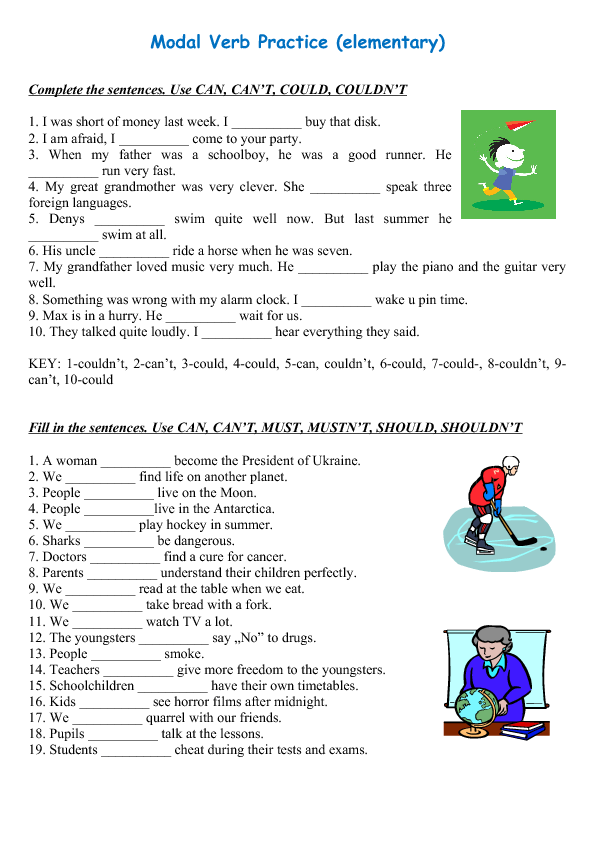
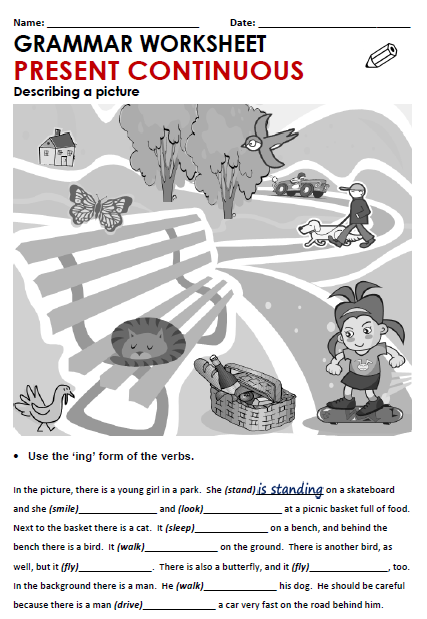
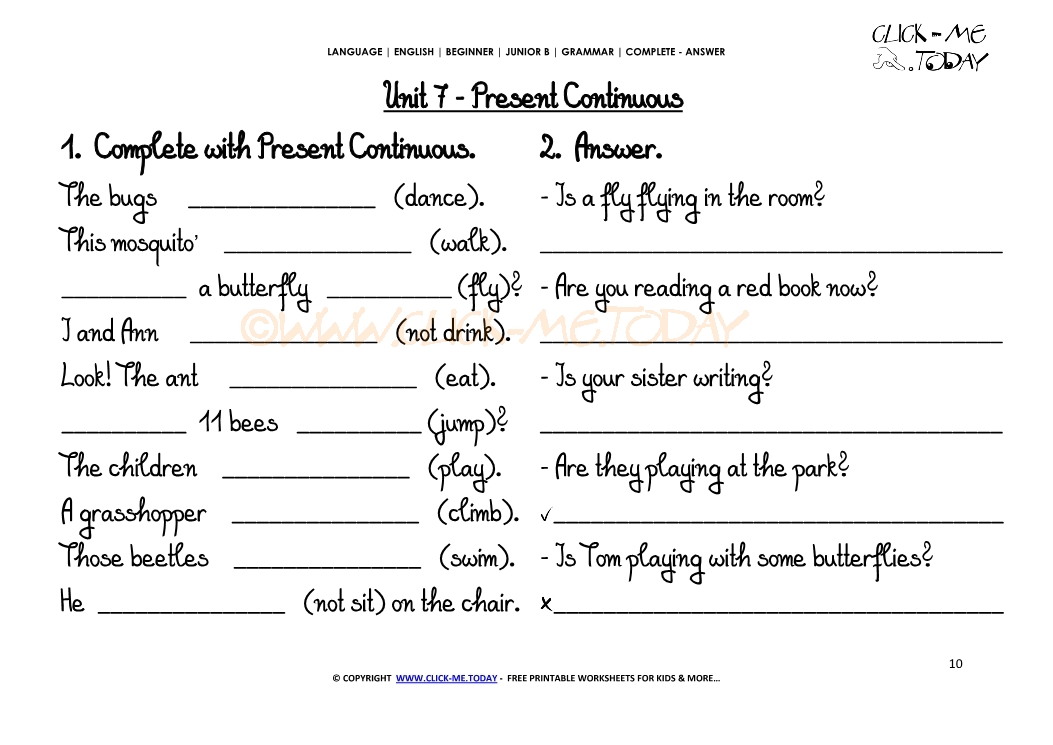
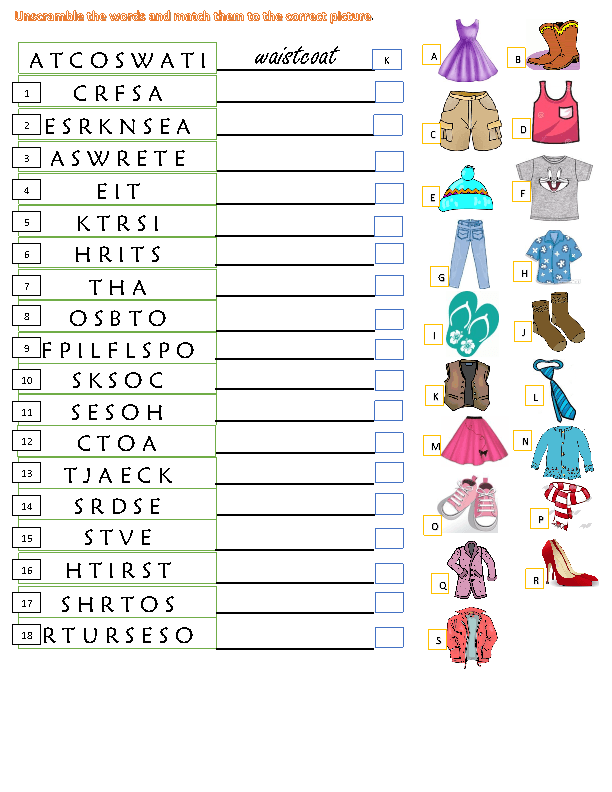
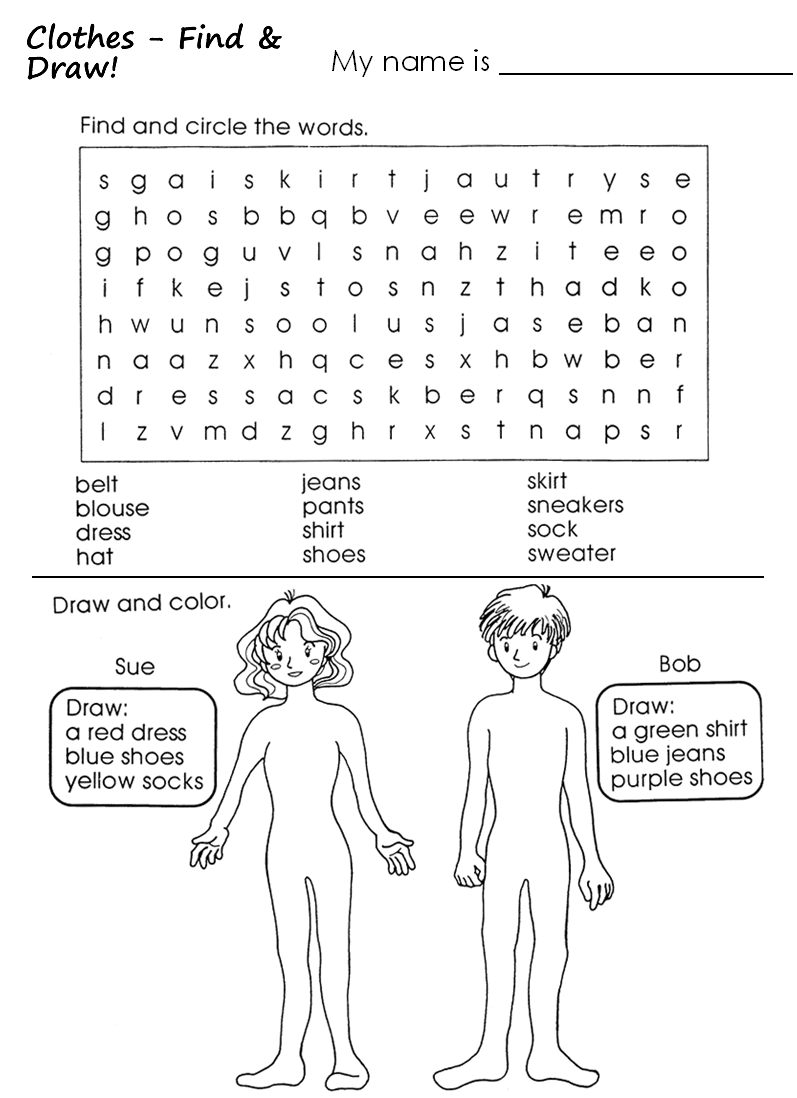
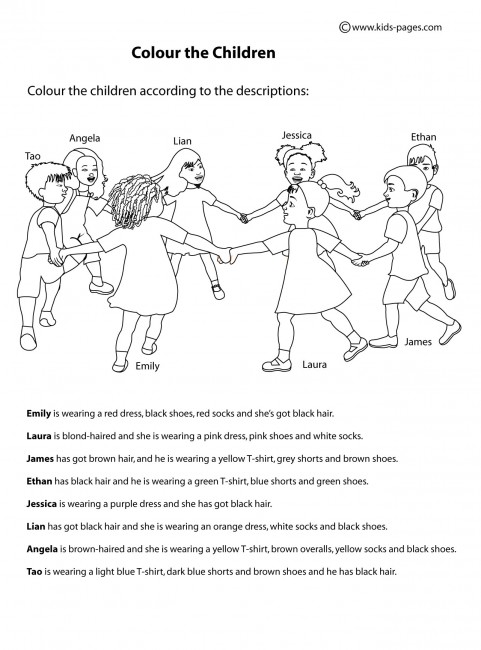


















































































que asparesca resuelto porfabor solo falta eso
ResponderBorrar